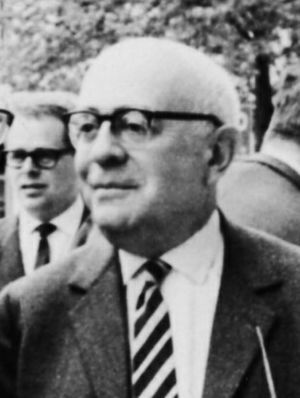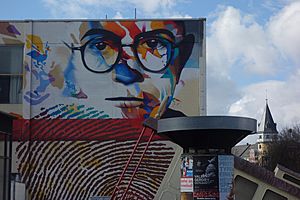Theodor W. Adorno facts for kids
Quick facts for kids
Theodor W. Adorno
|
|
|---|---|

Adorno in Heidelberg in April 1964
|
|
| Born |
Theodor Ludwig Wiesengrund
11 September 1903 |
| Died | 6 August 1969 (aged 65) |
| Spouse(s) |
Gretel Adorno
(m. 1937) |
| Era | 20th-century philosophy |
| Region | Western philosophy |
| School |
|
| Doctoral advisor | Hans Cornelius |
| Other academic advisors | Gilbert Ryle |
| Doctoral students | Hans-Jürgen Krahl |
| Other notable students | Jürgen Habermas |
|
Main interests
|
|
|
Notable ideas
|
|
|
Influenced
|
|
Theodor W. Adorno (born Theodor Ludwig Wiesengrund; 11 September 1903 – 6 August 1969) was a German philosopher, sociologist, psychologist, musicologist, and composer. He was a very important thinker in the 20th century.
Adorno was a main member of the Frankfurt School. This was a group of thinkers who used "critical theory" to study society. They used ideas from Freud, Marx, and Hegel to understand modern life. Adorno criticized both fascism and what he called the "culture industry" (how mass media shapes our lives). His books, like Dialectic of Enlightenment and Minima Moralia, had a big impact on new political movements in Europe.
Adorno was also a trained pianist and studied music composition. He loved avant-garde music (new and experimental music). This passion for music influenced his writings. He even worked with the famous writer Thomas Mann on his novel Doctor Faustus while they were living in California during World War II. Adorno also studied how people think about authority, prejudice, and propaganda. After the war, he helped rebuild intellectual life in Germany. He wrote about Germany's responsibility for the Holocaust and continued to speak out on public issues.
Life and Career Highlights
Theodor W. Adorno was born Theodor Ludwig Wiesengrund in Frankfurt am Main, Germany, on September 11, 1903. He was the only child of Maria Calvelli-Adorno della Piana and Oscar Alexander Wiesengrund. His mother was a professional singer, and his father ran a successful wine business. Maria wanted her son to use her family name, Adorno, so his early works were published as Theodor Wiesengrund-Adorno. Later, he changed it to Theodor W. Adorno.
Early Life and Music
Adorno's childhood was filled with music. His mother and aunt were both singers and pianists. He was a very talented child and could play Beethoven on the piano by age twelve. He went to school in Frankfurt and studied music composition. He also took private lessons with well-known composers.
During World War I, Adorno felt strongly against the nationalism in Germany. He and his future friends, like Walter Benjamin and Max Horkheimer, were disappointed that many German thinkers supported the war. This made them question traditional knowledge.
Adorno's father's business connected him to the Karplus family in Berlin. The oldest daughter, Margarete (Gretel), knew many intellectuals. Gretel Karplus and Adorno married in 1937 after knowing each other for fourteen years.
Adorno enjoyed the many concerts in Frankfurt. He also started writing music reviews and articles for important journals. He supported new, experimental music. He also studied philosophy, psychology, and sociology at Johann Wolfgang Goethe University in Frankfurt. In 1924, he earned his doctorate.
Studies in Vienna and Frankfurt
In 1925, Adorno moved to Vienna to study with the composer Alban Berg. He also continued his piano studies. In Vienna, he met other important thinkers and artists.
After Vienna, Adorno traveled through Italy before returning to Frankfurt. He continued to compose music and publish reviews. He also worked on his "habilitation" – a higher academic degree needed to teach at a German university. His first attempt was not accepted.
He then focused on a philosophical study of Søren Kierkegaard, a Danish philosopher. This work was accepted, and he became a university lecturer in 1931. However, just as his book was published in March 1933, Adolf Hitler took power in Germany.
Facing the Nazis
Adorno gave his first lecture at the Institute for Social Research. This was an independent group of thinkers who studied society. Adorno's lecture was controversial because he questioned if philosophy could truly understand reality. He believed it was better to focus on small details to understand the bigger picture.
The Institute started a journal, Zeitschrift für Sozialforschung, which published many of Adorno's essays. He wrote about music and social issues. As the Nazi party grew stronger, life became dangerous for people like Adorno. In September 1933, he lost his right to teach because he was considered "non-Aryan" (Jewish). His home was searched, and he was forced to leave Germany. He went into exile for 15 years.
Life in Exile: Oxford, New York, and Los Angeles
In June 1934, Adorno moved to Oxford, England. He continued to visit Germany to see his parents and Gretel. He worked on a critique of Edmund Husserl's philosophy. Meanwhile, the Institute for Social Research moved to New York City.
Adorno continued to write about music. He published essays like "On Jazz." He also started working on a book of short writings, which later became Minima Moralia. In 1935, he lost his aunt and his music teacher, Alban Berg.
Adorno was in close contact with Walter Benjamin, another important thinker. In 1937, Adorno visited the Institute in New York. Soon after, he married Gretel in England. He then moved to New York in 1938 to work for the Princeton Radio Project.
His work at the Radio Project was about studying the impact of radio music. Adorno was not happy with how the project focused on simple data collection. He wanted to understand how music changed when it became part of daily life. For example, he wondered how a Beethoven symphony sounded different when heard at home compared to a concert hall. His studies showed that mass media made music more uniform and less special.
In November 1941, Adorno moved to Los Angeles, California, to join Horkheimer. Many other German exiles, including Thomas Mann, lived there. Adorno and Horkheimer worked together on a book called Dialectic of Enlightenment. This book explored how human progress and reason could also lead to control and destruction. They wrote about the "culture industry" and how it controls people's thoughts.
They also studied antisemitism (hatred of Jewish people) and authoritarianism (a way of governing where one person or group has total power). Their 1950 study, The Authoritarian Personality, was very important. It used new methods to understand why some people are more likely to support authoritarian ideas.
During the war, Adorno and other exiles were considered "enemy aliens" in the USA. Their movements were restricted. Adorno also wrote Minima Moralia: Reflections from Damaged Life, a collection of short writings about exile, totalitarianism, and everyday life. He worked with Hanns Eisler on a study of film music and helped Thomas Mann with his novel Doktor Faustus.
In October 1949, Adorno returned to Europe.
Return to Germany
Adorno helped shape the intellectual life of West Germany after the war. He became a professor at Frankfurt University. He also taught music and criticized other philosophers. He was surprised by his students' interest in ideas but also saw that Germany was still dealing with its past. Many people who had supported the Nazis were back in government.
Essays on Fascism
Adorno wrote many important works about fascism. His book The Authoritarian Personality (1950) studied the traits of people who support authoritarian ideas. He also wrote essays like The Meaning of Working Through the Past (1959) and Education after Auschwitz (1966). In these, he argued that Nazi ideas still existed in Germany's way of thinking and institutions. He warned that fascism could rise again.
Public Life and Music
Adorno became a well-known public figure. He appeared on radio and wrote for newspapers. He discussed many topics, from "The Administered World" to "The Teaching Profession."
He also continued his musical work. He gave talks at music festivals and taught about new music. He believed that music should be free and not limited by strict rules. He also wrote a book about the composer Gustav Mahler.
Adorno became chairman of the German Sociological Society in 1963. He led important discussions about sociology. He also debated with another philosopher, Karl Popper, about how social science should be done.
Critiques of Society
Adorno criticized the way people talked about philosophy in post-war Germany. His 1964 book The Jargon of Authenticity criticized how some writers used words like "angst" and "decision" without deep meaning.
In 1966, he finished his major work, Negative Dialectics. This book explored how our thoughts and ideas are always changing and never fully complete. He taught seminars on this book to his students, including Angela Davis.
Student Protests
During the late 1960s, there were many student protests in West Germany. Adorno, like many students, was against the new emergency laws and the Vietnam War. However, he became critical of the students' methods, especially when they disrupted university life. He believed that their actions were based on a misunderstanding of the situation. He felt that building barricades was "ridiculous against those who administer the bomb." He even called some radical students "stormtroopers in jeans."
These conflicts made Adorno feel isolated. In September 1968, striking students threatened to damage the institute. The police had to be called to close the building.
Later Years and Death
Adorno continued to work on his book Aesthetic Theory, which was about the philosophy of art. He took a break from teaching to finish it.
In the summer of 1969, Adorno went to Zermatt, Switzerland, to rest. He was tired from his work and the student conflicts. On August 6, 1969, he died of a heart attack.
Influences on Adorno
Like other thinkers from the Frankfurt School, Adorno was greatly influenced by the ideas of Hegel, Marx, and Freud. These major theories were very popular among left-wing thinkers in the early 20th century. Some critics say that Adorno trusted these established ideas almost too much.
Main Works
Adorno wrote many books and essays. Here are some of his most important ones:
- Kierkegaard: Construction of the Aesthetic (1933)
- Dialectic of Enlightenment (with Max Horkheimer, 1944)
- Composing for the Films (1947)
- Philosophy of New Music (1949)
- The Authoritarian Personality (1950)
- Minima Moralia: Reflections from Damaged Life (1951)
- In Search of Wagner (1952)
- Prisms (1955)
- Notes to Literature I (1958)
- Mahler: A Musical Physiognomy (1960)
- Introduction to the Sociology of Music (1962)
- Negative Dialectics (1966)
- Alban Berg: Master of the Smallest Link (1968)
- Aesthetic Theory (1970)
Musical Compositions
Adorno also composed music. Here are some of his works:
- Für Sebastian Wedler (1919)
- 6 Studies for string quartet (1920)
- Piano piece (1921)
- String quartet (1921)
- 3 stories by Theodor Däubler for female chorus (1923–1945)
- 2 Pieces for string quartet, Op. 2 (1925/26)
- 7 short works for orchestra, Op.4 (1929)
- 3 Short Pieces for piano (1934)
- 2 songs for voice & orchestra after Mark Twain's "Indian Joe" (1932/33)
- Kinderjahr – Six Piano pieces from op. 68 of Robert Schumann (1941)
- 2 songs with orchestra
See also
 In Spanish: Theodor Adorno para niños
In Spanish: Theodor Adorno para niños
 | Selma Burke |
 | Pauline Powell Burns |
 | Frederick J. Brown |
 | Robert Blackburn |


